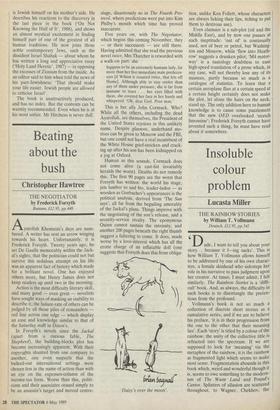Beating about the bush
Christopher Hawtree
THE NEGOTIATOR Ayatollah Khomeini's days are num- bered. A writer has sent an arrow winging towards his heart. Unfortunately, it is Frederick Forsyth. Twenty years ago, he set De Gaulle memorably within the Jack- al's sights; that the politician could not but survive this sedulous attempt on his life was an apparent fact of history which made for a brilliant novel. One has enjoyed others more, but Henry James does not keep readers up until two in the morning.
Action is the most difficulty literary skill, and many good — even great — novelists have sought ways of masking an inability to describe it; the failure-rate of others can be judged by all those piles of remainders — red line across one edge — which display an ease and knowledge similar to that of the Saturday staff in Dixon's.
In Forsyth's novels since the Jackal (apart from a curious fable, The Shepherd), the building-blocks plot has become increasingly apparent. With their copyrights shunted from one company to another, one even suspects that the bulked-out international settings were chosen less in the name of action than with an eye on the expenses-column of the income-tax form. Worse than this, politi- cians and their associates ceased simply to be an assassin's target and moved centre- stage, disastrously so in The Fourth Pro- tocol, where predictions were put into Kim Philby's mouth which time has proved inaccurate.
Five years on, with The Negotiator, which begins this coming November, they — or their successors — are still there. Having admitted that she read the previous novel twice, Mrs Thatcher is rewarded with a walk-on part: she
happens to be an extremely humane lady, far more than her five immediate male predeces- sors [if Wilson is counted twice, that lets off Home]. Although able to stay cooler than any of them under pressure, she is far from immune to tears . . . her eyes filled with them, she covered her face in her hands and whispered: 'Oh, dear God. Poor man.'
This is her ally John Cormack. Who? While all the others, including the dead Ayatollah, are themselves, the President of the United States rejoices in this unlikely name. Despite glasnost, underhand mo- tives can be given to Moscow and the FBI, but one could not have a real incumbent of the White House grief-stricken and crack- ing up after his son has been kidnapped on a jog at Oxford.
Human as this sounds, Cormack does not come alive (a cast-list invariably heralds the worst). Deaths do not remedy this. The first 90 pages are the worst that Forsyth has written: the world his stage, jets lumber to and fro, leader-laden — as wooden as Gorbachev's appearances is the political analysis, derived from 'The Sun says', all far from the beguiling amorality of the Jackal's plans. Things improve with the negotiating of the son's release, and a security-service rivalry. The eponymous Quinn cannot sustain the intensity, and another 200 pages beneath the right thumb suggest a faltering to come. It does, made worse by a love-interest which has all the erotic charge of an inflatable doll (one suggests that Forsyth does this from obliga- 'Daisy's over the moon'. tion, unlike Ken Follett, whose characters are always licking their lips, itching to put them to dextrous use).
Even clumsier is a sub-plot (oil and the Middle East), and by now one pauses at each ineptitude: 'out of' is continually used, not of beer or petrol, but Washing- ton and Moscow, while 'flew into Heath- row' suggests a drunken pilot; `M4 motor- way' is a tautology doubtless to ease high-speed translation of a prose which, in any case, will not thereby lose any of its nuances, partly because so much is a catalogue of statistics. To learn that a certain aeroplane flies at a certain speed at a certain height certainly does not make the plot, let alone the hairs on the neck, stand up. The only addition here to human knowledge is to cause some puzzlement that the new OED overlooked 'stretch limousine'; Frederick Forsyth cannot have invented such a thing, he must have read about it somewhere.


















































 Previous page
Previous page